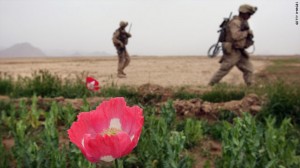Among environmentalists, biofuels are almost as divisive an issue as NATO military operations in Afghanistan are in wider public discussions.
Yet two American businessmen believe that home-grown biofuel in Afghanistan could be a “green” solution to some of the larger problems the country is experiencing including military casualties, energy security and the opium trade.
Wayne Arden, who has a background in technology and finance, and John Fox whose career has been in the renewable energy field, published a White Paper on producing and using biodiesel in Afghanistan earlier this summer.
While the authors discovered many benefits to a biofuel industry in Afghanistan the reason for their work came in December 2009 with news of more U.S. troops being sent to the country.
“The main customer here is the U.S. military so we want to make the logistics as easy as possible for them to use the biodiesel,” Arden told CNN.
[ad]
Arden and Fox suggest that casualties from protecting fuel convoys in the country (one death from every 24 convoys, according to their report) could be drastically reduced if home-grown biofuel was used in place of imported diesel.
With the creation of a biofuel plant near the military bases of allied forces around Kandahar, they also suggest the high cost of importing fuel used for military transportation and generators would be seriously reduced.
A medium-sized power plant, they say, would cost $90 million.
As well as the environmental benefit of reduced CO2, Arden and Fox argue biofuels would fit well with the U.S. military’s $1.5 billion annual environmental program.
Whether Afghanistan’s opium production — estimated to be worth $2.8bn in 2009, and employing 1.6 million people, according to the UN Office on Drugs and Crime — could be switched to biofuel production is another question.
However prior to Arden and Fox’s report there have been direct calls for poppies to be turned directly into green biofuel.
Marc Grossman, the former U.S. ambassador to Turkey, suggested in a report in July that counter-narcotics goals and environmental concerns could be matched by such a project.
“The advantages would be manifold: less illicit poppy, less money to fuel narco-terrorism, and perhaps some small impact on the amount of pollution put into the air by trucks in the region,” Grossman wrote in a report for The German Marshall Fund for the United States.
Poppy seeds as a biomass for fuel are in limited production; the Macquarie Oil Company has a refinery in Tasmania, Australia that has produced biofuel to power agricultural vehicles.
Arden and Fox admit biofuels could have a role to play in reducing opium production but say that poppy seeds are not as good a biomass for fuel as other crops.
“You can extract oil from poppies and make diesel from it. The issue is it doesn’t necessarily do the job of moving the country away from an illicit drugs trade,” said Arden.
Instead the report authors suggest the use of a different crop, safflower, as the main biomass, as it native to Afghanistan, works almost as well as petroleum in cold weather and can be used as 100 percent biodiesel in generators.
“[Safflower] is very drought resistant. It doesn’t use more water than poppy, which is the crop we’re trying to replace,” said Fox.
“And we expect unintended consequences. A case where a farmer could rip out a crop like wheat and plant safflower, or there’s too much production and in that case if safflower oil is consumed, it is a very healthy oil.”
Looking beyond the military action in Afghanistan, the white paper authors are confident biofuels would have future when allied troops left the country.
“The [proposed] plant is sized to provide electricity to 5,000 soldiers, but also it’s also sized to provide biodiesel to the local electrical utilities that are currently using petroleum diesel. Someday the U.S. military will leave, but that plant can still serve the region,” said Arden.


